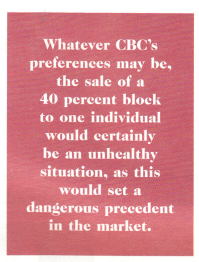The commercial sector awaits with bated breath a decision of the Monetary Board. A decision that could set a precedent and send the banking sector in Sri Lanka on a rock and roll. The sale of a forty percent block of the Commercial Bank of Ceylon Ltd., (CBC) has caused a controversy and many Sri Lankan bankers are wondering as to why there is such a long deliberation on the part of the Monetary Board to arrive at a decision, when the banking act is clear on this point that one in- dividual or entity cannot own more than ten percent of a bank.
The feedback the market gets is that the Monetary Board is considering whether they can allow this forty percent block to go in one parcel in “the national in tersest” This forty percent parcel represents ten million shares of Commercial Bank, and it is reported that there are two offers, one from the Hatton National Bank (HNB) and another from the Development Fi- nance Corporation of Ceylon (DFCC). Both offers are said to be equal in value. The present owners of these shares- The Standard Chartered Bank happened to hold this large block as they purchased these shares in Commercial Bank before the Banking (amendment) Act, No.33 of 1995, stipulating the size of each holding.
Be that as it may, this indecision by the Monetary Board has caused ripples in the market and the most shaken by this, is the directorate of the Commercial Bank. They fear that the HNB, (now portrayed as the bogy man in the banking sector), may acquire an unhealthy control of their bank. In their enthusiasm to stop HNB from taking control of this forty percent block they have presented an interesting analysis into the nuances of banking law and the health of the whole banking sector itself.
The strategic acquisitions made by HNB in the past years is the driving force to this fear. Looking closely at its history one could see that HNB has systematically acquired interests in the Mercantile Bank and Emirates Bank. They also took over the operations of the Indosuez Bank, recently. If they acquire an equity interest in CBC now, they will also have an indirect interest in the State Mortgage & Investment Bank, which CBC has successfully tendered for under the privatization programme. Commercial Bank sources point out that The Central Bank of Sri Lanka in their previous discussions with the Sri Lanka Banks’ Association, had agreed in principle on the directions to be issued under section 17A of the Banking Amendment Act. Sub section 1 of this section, i.e., section 17A, says “a licensed commercial bank shall not acquire or hold shares of any company other than a listed public company and
a) any shareholding acquired by such bank shall not be in excess of such percentage of its capital funds as the Monetary Board may determine from time to time and,
b) the aggregate amount invested in the shares of listed public companies (excluding companies which are subsidiaries of the bank) shall not exceed such percentage of its capital funds as may be determined from time to time by the Monetary Board.”
CBC’s main concern is that if HNB purchases 40 percent of their equity, they would not be considered a subsidiary in terms of Section 17 (3) of the Banking Act and therefore the parameters which had been discussed and agreed with all commercial banks would be contravened by HNB. In a submission to the Monetary Board of Sri Lanka, CBC has marked out the parameters that would be contravened, they are The Central Bank has proposed that investment in any listed company should be restricted to a maximum of 10 percent of capital funds. According to the HNB’s published accounts for the year 1995, the maximum investment permissible under the proposed direction would be Rs 213.8 million. The proposed acquisition in the equity of CBC by HNB exceeds Rs 1 billion.
• The Central Bank has suggested that the maximum aggregate amount of investment in all listed companies is to be confined to a maximum of 30 per- cent of capital funds. In relation to HNB’s published accounts for the year 1995, the maximum aggregate amount of investment that could be held will be Rs 641.42 million. Therefore, the proposed investment in CBC would vastly exceed this parameter.
The Central Bank has pro- posed that an investment in the capital of any listed company should not exceed twenty per- cent of the capital of that company. Twenty percent of the equity of CBC would amount to Rs 50 million whereas HNB intends acquiring a 40 percent stake in the equity of CBC paying a con- sideration of over Rs 1 billion the acquisition of 40 percent of interest in CBC by HNB, if ap proved by the Monetary Board, would result in breach of all the proposed directions under Section 17A of the Banking Amendment Act which are to be issued as formal directives shortly.

There is a school of thought which believes that the purchase of this block of 10 million shares of CBC may also have some negative effects on HNB. As banking sources point out, it will vastly reduce their capital adequacy ratio. These sources say “Section 14(3) of the Banking Amendment Act No. 33 of 1995 pro- vides, that licensed Commercial Banks shall at all times maintain a Capital Adequacy Ratio as may be determined from time to time by the Monetary Board. The relevant section says, ‘Every licensed commercial bank shall at all times maintain a capital adequacy ratio as may be determined by the Monetary Board, which shall in determining such ratio to be maintained, as far as practicable adopt the guidelines for capital adequacy set out by the Bank for International Settlement in Basle’ (Basle – International Agreement).”
The banking sources also point out that Central Bank’s Circular of October 1, 1993- Section 51.2 on Capital Adequacy Requirements, has made it mandatory for all Commercial Banks to deduct from their capital, the investments made in Banks and Financial Associates, in computing the Capital Adequacy Ratio.
If HNB is to purchase these 10 million blocks of shares at the rate of Rs 103/- per share, they will have to deduct from their capital, a sum of Rs 1,030 million. Once these adjustments are made it is alleged HNB will not be able to maintain their Tier II Capital Adequacy Ratio at the required level. However, HNB can overcome this by bringing a large infusion of capital, through rights issues, long term debts etc. The DFCC is the other party to have put up an offer for this bank and it looks like the directorate of Commercial Bank welcomes this partnership even up to them holding the 40 percent block.
“Business Today” reliably understands that CBC has indicated to the Monetary Board that the DFCC partnership would add synergy to the operations of both institutions and have urged them to consider this in “national interest.” Commercial Bank says that the operations of DFCC which are essentially focused on development/merchant banking would complete the operations of CBC which enjoys a niche market in trade finance and corporate banking. Whatever CBC’s preferences may be, the sale of a 40 percent block to one individual would certainly be an unhealthy situation, as this would set a dangerous precedent in the market. Banks could be targeted by unscrupulous elements who would be able to own and control large blocks and thereby put the depositors’ money in danger.
Another important point to be noted in this interest shown by both banks, is the fact that whether they buy 10 percent or 40 percent, they would not be able to put their nominee on the CBC board. The Banking Act is very clear on this fact that an employer or a shareholder of one bank cannot be a director of another. Another aspect to be considered is the fact that if 40 percent of CBC goes to one party it would automatically trigger of The Take Overs & Mergers Code. Whoever takes this parcel would then have to make an identical offer of purchase to all the shareholders of CBC, which would lead to chaos as it would be against all laws of banking. This matter is purely of academic interest at the moment, but “Business Today” reliably understands that the Securities & Exchange Commission has asked an opinion from the Attorney General’s Department as to what stand they would have to take in the eventuality of the Monetary Board approving the sale of the 40 percent block to one party. “If this sale goes through enbloc, Sri Lanka would certainly see a change in the structure of banking”, one concerned banker told “Business Today”.






